Reimagining London’s Public Services with Tech, Data & Innovation at the IET
On Wednesday 11th September, as the digital lead for Local Government at Starfish Search, Rosalind Lambert had the pleasure of attending Reimagining London’s Public Services with Tech, Data & Innovation at the IET. It was an incredible event with Eddie Copeland, Director at LOTI, as key speaker.
Eddie gave a great lecture on the future of Local Government and how using data and technology to innovate we can really improve lives of our communities, as long as the people, the users, are taken along on this journey. Tech is not just a waving a magical wand and implementing a new system, especially where digital poverty exists. We need to be able to firstly lift our communities out digital poverty before innovation can truly happen. Additionally, it is important that Borough’s work together, sharing ideas, data, costs and innovations as the solutions affect all Londoner’s as relatively few citizens live and work in one Borough and this is where LOTI has its maximum impact.
That said, innovation and the art of imagination of what we can do has started to have positive returns. The South London Partnership is using IOT sensors for preventative measures for flooding, RBKC are using generative AI to assess and prioritise resident spotted graffiti for cleaning, Brent is starting to use AI to write up case notes in social care freeing up valuable time, and Harrow is using a visual AI tool to reconcile advertising hoardings with business rates, resulting in capturing lost revenue. Outside of London Swindon has reduced its translation costs by 99% through using Google Translate and has increased public engagement by being able to communicate in citizen’s native language.
Against a background of cost cutting there are some great ideas and innovations taking place not only in the capital with this month Sunderland City Council’s Digital Inclusion Programme winning the Community Improvement Award at the Connected Britain Awards. Sunderland have helped over 200,000 residents’ access vital digital services and have doubled full-fibre connectivity across Sunderland in just 12 months. Long may it continue.
Should you wish to have a chat about your digital transformation journey, please contact the team at info@starfishsearch.com.
Webinar: Embrace your Imposter
Starfish Search and PPMA Webinar: Embrace your Imposter
Friday the 4th of October 2024 at 12pm – Register here
Imposter syndrome comes in many forms – not just self-doubt. Imposter syndrome can affect anyone of any gender, at any age and stage of their careers. It’s also been identified as a key symptom during perimenopause. We’re delighted to announce an exciting and insightful upcoming webinar for the PPMA, looking at the feeling of imposter syndrome when starting a new role.
The session will aim to give you an understanding of your own imposter, what type of imposter you are, and a toolkit to help you love your imposter as a friend not a foe. We will walk you through the realities of imposter syndrome with some real-life case studies and then uncover ways to harness the fear, reframe it and overcome any feelings of being an imposter in the workplace.
- What imposter syndrome is
- How it manifests
- Why we suffer from imposter syndrome
- The five types of imposters
- Imposter syndrome solutions
This interactive session will be led by City CV’s CEO & Founder, Victoria McLean. Passionate about DE&I, Victoria is an international keynote speaker at female-focused events. Her original insights address topics including imposter syndrome, the art of personal branding, the impact of menopause on business success, setting boundaries at work, and staying visible in a hybrid world.
Get in touch with the team at info@starfishsearch.com for more information.
Starfish Search take on Yorkshire’s Three Peaks with the Public Sector Challenge
A superstar team from Starfish Search are undertaking the Yorkshire Three Peaks Challenge this September. Organised by the amazing people at Public Sector Challenge, The goal is for teams to beat the clock (within 12hrs) and climb the 3 biggest peaks in Yorkshire alongside other Public Sector Teams and private sector partners. The teams will be undertaking the challenge to raise money for Cancer Research UK, a cause that lies close to everyone’s hearts at Starfish Search.
Chief executive of Brentwood BC and Rochford DC, Jonathan Stephenson, devised the plan to create the Public Sector Challenge after leading his own teams on a similar challenge back in 2022 where 30 employees from the council raised more than £12,000 for local charities when they took on the Three Peaks Yorkshire challenge. The challenge consists of a 26 mile walk and climb over 12 hours and includes 1585m (5200ft) of ascent. It takes on the peaks of Pen-y-Ghent (694 metres), Whernside (736 metres) and Ingleborough (723 metres). These hills form part of the Pennine range, and encircle the head of the valley of the River Ribble, in the Yorkshire Dales National Park.
There’s still time to contribute, please visit the link here to donate. Check out some of the pictures below.
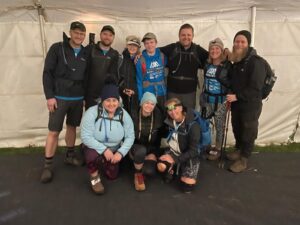
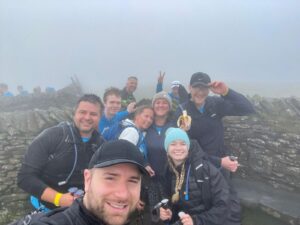
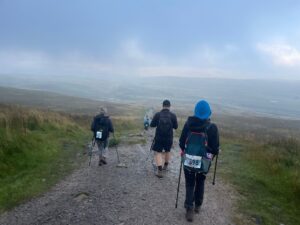

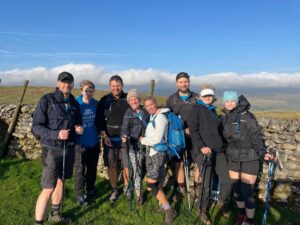

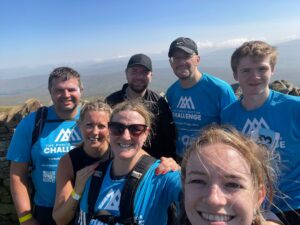
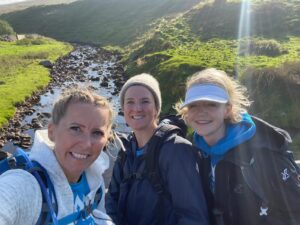
Starfish Sessions with Alison Brown
On this month’s edition of Starfish Sessions, Tim Farr sits down with Alison Brown, External Affairs expert and proud advocate for neurodiversity.
Please do introduce yourself: who you are, with a brief summary of your career?
I’m Alison Brown, and I’m Director of Communities and External Engagement at the Open University. This is the third university I’ve worked in, and before that I spent 10 years working in central government.
Can you tell us a bit more about the work you’re doing currently?
I see my role as helping the OU to be more externally facing. I really enjoy the variety of working across different functions, and building bridges across boundaries to collaborate with internal and external partners. This has been the best role of my career: the OU’s powerful social mission is very energising, and I enjoy spotting synergies across our complex stakeholder landscape.
What strengths do you bring to your work?
I have lots of partnerships expertise but I’m not a specialist. I think this is linked to me being neurodivergent: I don’t like specialising, I prefer variety, drawing on the best of comms, external affairs, policy, and income generation. I create coherence across multiple functions, which helps when navigating complexity. External partners appreciate when I can explain the whole organisational offer.
But that approach can make it tough for me to search for a job. Vacancies often focus on one specialism, but I don’t fit neatly into a little box. It’s such a missed opportunity when teams work in silos.
I noticed you’ve split your time between permanent and non-executive work, is this a challenge to balance?
Another example of me finding ways to stretch myself. I was careful to choose roles that don’t require a huge time commitment. Whereas some people might find these different roles a distraction, I actually perform better at the OU because I am building my network, learning about myself, and capturing ideas that I can apply in my day job. I love spotting connections and bringing wider learning from my non-executive roles back to the OU.
You state publicly on your LinkedIn profile that you proudly neurodivergent and an advocate for neurodiversity. Can you tell us a bit more about your own neurodiversity?
I was diagnosed with ADHD about 3 years ago – up until that point I had no idea. I remember going to a presentation about neurodiversity with a previous employer and came out none the wiser. The presentation focused on the medical definitions, but I had learned how to fit into a neurotypical world in my life so I couldn’t recognise any of it.
There were plenty of hurdles to overcome to reach the point of diagnosis. Having made that progress, it drove me to start sharing my experience and talking about my neurodivergent experience: explaining how it feels, the things that can’t be defined or measured so aren’t covered in the diagnostic process.
I’m very careful about the wording I use on my LinkedIn profile. I like the word “neurodivergent”: it’s intentionally broad. Adding this to my profile starts conversations without people making assumptions about me. If I described myself with the label “ADHD”, many people will jump to conclusions based on what they know about ADHD, whereas actually they don’t know about my ADHD.
For example, I often find it difficult to follow social interactions, and I really struggle with sensory overload. Both of these are more commonly linked to autism. Pre-diagnosis, I assumed I was socially inept – I felt like the outsider. I had no idea I was experiencing sensory overload until I investigated it, yet with hindsight, I remember sitting on a train with headphones on without any music – I was trying desperately to block out sounds. In so many aspects of my life, I was just functioning, burying emotions to keep going. Apparently successful on the outside, yet inside, feeling isolated and confused.
How long have you been consciously aware of your neurodiversity?
I had no idea before I was formally diagnosed. I remember searching online “reading disability not dyslexia.” I struggled to absorb information while reading, I could read the words so I knew it wasn’t dyslexia, but I couldn’t absorb and combine the meaning. That was the only clue I had. Everything else I noticed pre-diagnosis, you could sum up as a character flaw – missing trains, interrupting people, losing control of my inbox, leaving deadlines until the last minute. Undiagnosed ADHD can trigger a huge amount of shame because it looks as though you’re just not trying hard enough.
Do you think neurodiversity has had an impact on your career, and if so, in what way?
You could say I have an ADHD CV – I changed jobs every year, in fact my current role is the longest role I’ve ever had. I’ve always looked for a new challenge, but some hiring managers are sceptical of so much change. Getting a diagnosis means I can understand my brain, which makes it possible to stretch myself in new ways without changing role so frequently.
I’ve had jobs that have played to my strengths and others that haven’t. It’s not just the jobs themselves – the culture of the organisation and line management are both massively important. The more I know about myself, the more I can make an informed decision when choosing a job to put myself in the best position to succeed.
There are many ways employers can be neuro-inclusive – these things often benefit everyone. For example, easy to navigate website and application form, a clear corporate message and plan, succinct job descriptions, precise application instructions. Neurodivergent candidates will struggle more if those things aren’t in place.
What impact, positive or negative, has being an open and proud advocate for neurodiversity had?
There’s an element of self-interest in my decision to be open about this, my neurodiversity is still new to me so talking about it helps me process this new part of my identity.
Neurodiversity is invisible unless we talk about it. I flag barriers I’ve faced and how I get over them in the hope that others will find it easier next time. I’ve found colleagues approach me and share similar experiences about themselves and relatives.
Charities like Genius Within and Neurodiversity in Business and are making huge strides. There’s still a lot of misunderstanding and myths about neurodiversity and I’d encourage everyone to visit these websites to learn how they support themselves and others.
As a recruitment organisation, I’d be particularly interested to hear about your experience during interview and wider employment processes, both good and bad. Have you had any difficulties during these processes? Or positive experiences you’d like to share?
The bad – ignoring requests for reasonable adjustments, the email is left unanswered, and giving very short notice for interviews.
The middle – providing questions in advance when requested, but asking them in a different order or going off on unstructured tangents.
The good – prompting candidates throughout the process to request reasonable adjustments. Being responsive and understanding.
Sharing photos of the interview panel before the interview. Scheduling breaks if there are several assessment stages in one day, to reduce overwhelm. Offering flexibility on the format if a presentation is involved: instead of insisting on slides, ask instead “how would you prefer to share your views on this topic we’ll be discussing?” I’ve always felt the interview process needs to be reimagined. Interview panels are memory tests, you need examples prepared, the ability to recall those examples succinctly and adjust depending on how many examples are required. How many jobs actually require a strong memory?
If you look at standard interview tips, it’s common to insist on maintaining eye contact, yet I do my best thinking looking off into the distance. There are so many logistical and sensory challenges for me attending an interview in person – these are not the best conditions in which I can thrive.
If an employer has a rigid or vague interview structure, as a candidate I know I won’t feel psychologically safe in your culture and I won’t be able to demonstrate my strengths.
What has been your experience of workplace support and adjustments, and do you think current systems do enough to support neurodiverse people?
No, I don’t think there is enough support for neurodivergent employees currently. There are definitely pockets of good practice, but by and large organisations aren’t doing enough to educate their staff about neurodiversity, particularly line managers who must play such an important role.
I really encourage line managers to listen, invest time in learning and listening to the needs of employees. Line managers can help colleagues navigate systems, because requesting support can feel emotionally vulnerable and draining.
Access to Work government grants have been valuable in funding workplace adjustments and coaching to help me perform at work (although I hope approvals will be processed more quickly in future).
What’s been the proudest moment of your career?
Landing on my feet at the OU and succeeding while adjusting to discovering my neurodivergent identity.
What advice would you give to your younger self with the knowledge you have now?
When people are late diagnosed, it usually prompts some feelings of regret or sadness. You think back to previous situations where you were struggling and you didn’t understand – finally you know why. I prefer to look forward, I wouldn’t want to change the past, but it can feel very emotional, empathising with my younger self.
What’s my advice? If there’s something that doesn’t make sense or you’re struggling with, investigate further. Talk to other people, listen to experiences and see if you can find something that resonates. Anything that can help you understand your experience better will make it easier for you to flourish and put yourself in settings that play to your strengths.
Starfish Search’s Lorraine Payne recognised in the Top 10 Interim Service Providers in the Industry
We’re delighted to announce that Lorraine Payne, one of our esteemed interim search experts, has been honoured in the Institute of Interim Management (IIM) 2024 Interim Management Survey as one of the Top 10 Interim Service Providers in the country.
The IIM is the leading professional body dedicated to supporting and advancing interim managers across the United Kingdom. They represent the interests of professionals who deliver interim management services across a wide range of industries, providing leadership, managing change, and filling critical roles in organisations during times of transition. The IIM is committed to promoting excellence and upholding the highest standards in the interim management profession and plays a crucial role in equipping interim managers with the necessary tools to succeed in today’s complex and dynamic business environment.
The IIM’s annual Interim Management Survey is a cornerstone initiative in the UK’s interim management sector, providing vital insights into industry dynamics. This survey offers transparency and valuable benchmarking tools, aiding both interim professionals and hiring organisations in making well-informed decisions.
With 14 years of experience in the recruitment industry, Lorraine Payne is passionate about building relationships across various sectors with both clients and candidates. At Starfish, Lorraine leads the placement of interim managers within the Local Government sector, focusing on a UK-wide remit. Lorraine shared her thoughts on the recognition, stating, “I am deeply honoured to be recognised in the Institute of Interim Management’s Interim Management Survey Top 10. This acknowledgment is a testament to the hard work and dedication of the entire team. We continually strive to deliver excellence in every engagement. It’s a privilege to be part of such a meaningful purpose as an organisation and provide real positive change for our clients and the industry. This recognition only further motivates us to keep pushing the boundaries of what we can achieve together.”
Being featured in the IIM’s Top 10 Interim Service Providers is a significant accolade, recognising both individual and organisational excellence in the interim management industry. This honour reflects Lorraine’s outstanding commitment to delivering high-quality interim solutions, our strong reputation for client satisfaction, and our mission to contribute to the professional development and diversity of interim managers.
Get in touch with Lorraine Payne at Lorraine.Payne@starfishsearch.com, or to contact the wider interim team, reach out to interim@starfishsearch.com.
CTRL+ALT+LEAD: Navigating the Future of Leadership in the Digital Age
Following on from our last thought leadership event where over 60 national CEOs met at the Institute of Contemporary Art to discuss our What3Words Leadership report, we’re delighted to announce our new project for 2025. Titled, Ctrl + Alt + Lead: Navigating the Future of Leadership in the Digital Age, our new report will explore what the future holds for the fast-evolving world we are leading in, and what this will mean for shifting leadership qualities.
In an era where artificial intelligence and digital transformation redefine the way we work, lead, and grow, Starfish is at the forefront of these changes. Our newest research will deep dive into how AI is reshaping the expectations and qualities of effective leadership. We’ll discover how leaders can leverage technology to foster innovation, inclusivity, and adaptability, while maintaining the human touch that makes leadership meaningful.
We’re honoured to have the support of an additional cohort of leading influential organisations active in the Invention, Innovation and Tech & AI space, each adding their unique perspective on the opportunities and complexities that lie ahead for all of us.
It’s quick to take part. To submit your entry, which will be included in our report scheduled for completion this Autumn, all you need to do is complete the three questions in the form at the link here – CTRL ALT LEAD application form.. As we expect a high volume of entries, we’re keeping word count limited and will produce an analysis of your responses on completion.
When ready, please send your entry to thefutureholds@starfishsearch.com.
Director of Essex Digital Service recruitment – Online Event
We are pleased to be hosting an online information session with Essex County Council to discuss the recruitment of the new Director of Essex Digital Service.
This will be a chance for anyone who is interested in the role and Essex County Council to join us and hear from Nicole Wood, Essex’s Executive Director Finance & Technology. Nicole will share more about this exciting position as well as the council’s ambitions for digital and whole council transformation.
It will also give you the chance to ask some specific questions about the role, the Council and the application process.
The event will take place via Zoom on Tuesday 3 September 2024 from 6pm – 7pm.
Fill in the form below to register your interest. We look forward to seeing you there!
The Institute of Interim Management 2024 survey results
We are delighted that Starfish Search has risen from 23rd to 16th in 2024 making us now a Gold supplier within the Interim Management industry. Starfish Search turned five this year and we have developed our Interim Talent practice focusing on the Social Sector, Local Government and Public Policy markets. We remain committed to supporting the interim market with a fresh and honest approach.
The results of the survey are always interesting and insightful. What is quite stark this year is the changes in the split between interims in the private vs public sector, with 68% responding to the survey coming from the private sector. This figure has risen 11% since 2023, against 27% of interims who responded from the public/third sectors, which is a reduction from 37% in 2023. The mood is also quite different from interims responding from the private sector. There is more confidence and optimism for growth in private sector against the public sector which has a less positive outlook. I am sure we are all feeling that, as public sector budgets are flat and even with a new government in place, we do not expect to see this change quickly. Today we had the Kings Speech, and the new government will promote “economic stability” giving more confidence to private investors about the economy and policy. There is a clear commitment to place economic growth and wealth creation in communities as a “fundamental mission”. At Starfish we see 2024 as the year for hope and optimism.
What is encouraging for Starfish is that we are growing our market share, across all our sectors, and we have an experienced team of sector experts who can help/advise you at different stages within your interim search. We were also delighted to see Lorraine Payne who focuses on the Local Government market being recognised in the top 10 Consultant list for the first time.
To read the full survey please click here.
If you would like to talk to a Starfish Consultant or register your CV with us for future interim roles – interim@starfishsearch.com
Please also follow us on Linked In to be kept up to date on events, webinars and live roles – https://www.linkedin.com/company/starfish-search/